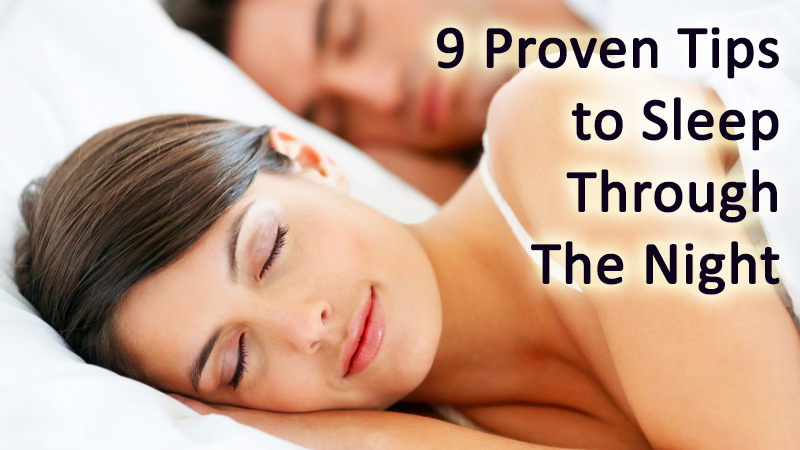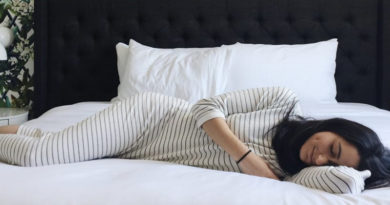9 Proven Tips to Sleep Through The Night
If you think healthy diet and regular exercise is all you need to stay healthy, then you have grossly underestimated the benefit of quality sleep to your well being.
The importance of sleep becomes immediately apparent among those who cannot get enough of it over the night.
Such people end up dealing with hormonal imbalance, mental issues, and even physical performance challenges.
The risk of getting some diseases also increases with lack of enough sleep. Furthermore, both adults and children have been observed to end up with weight gain due to lack of adequate sleep as well.
Studies have also observed that those who get enough sleep are much healthier in general. With enough sleep, you will tend to eat less, exercise more and have better overall health.

Fortunately, despite the fact that studies are increasingly demonstrating the importance of enough sleep, people have been getting less of it over the past couple of decades. For many people, getting inadequate sleep is practically the norm today.
But if you are having sleep problems and want to turn things around, then there is plenty you can to remedy the issue. Sure, after a routinely getting inadequate sleep, kicking this habit might take some effort.
Luckily, here are some proven tips to getting a good night’s sleep.
9 Proven Tips to Sleep Through the Night
- Have A Comfortable Bed, Mattress and Pillow
If you are one of those people wonders why you sleep so well in hotels and not your own home, you might need to rethink the level of comfort your bed, mattress, or pillow gives you.
The hospitality industry knows the art of making beds comfortable for a more rewarding sleeping experience.
In fact, the benefits of a good bed can extend far beyond better sleep quality. With a good bed, you can also lower back pain by 57%, reduce shoulder pain by 60%, and reduce back stiffness by 59%. Sleep quality can also increase by 60%.
So, if you do not have a comfortable bed, mattress and pillow already, having a sleep environment that offers you this comfort could completely eliminate your sleeping problems.
Sleep Sherpa has a number of quality sleep-related products you can use to get more comfortable, and hence, better quality sleep, including pillows and mattresses.
You should also make sure you upgrade your beddings every 5 to 8 years to ensure you always have a comfortable place to get a good night’s sleep.
- Avoid Caffeine Late in the Day
About 90% of Americans consume coffee every day. However, while it has many documented health benefits, taking coffee late in the day can bring with it some downsides when it comes to getting quality sleep.
Coffee is a stimulant, and it makes you more focused and energetic, which can be great when the day is just starting and you need to do your best at work. However, these same effects are not good for someone who needs quality sleep.
Essentially, you should not take coffee six hours before bed, as this can affect sleep quality substantially. In fact, coffee and its stimulating effects on the nervous system can stay in the body for up to 8 hours.
However, if you feel the urge to take a cup of coffee, you can always take decaffeinated coffee. High levels of caffeine can make insomnia worse and significantly lower sleep quality.
- Avoid Long Daytime Naps and Irregular Sleep
Studies have shown that irregular sleep can result in sleep problems. However, short power naps can have noticeable benefits on sleep.
But when the daytime sleeping takes too long, your internal clock gets disrupted, and getting sleep at night might be a problem.
The impact of daytime sleeping, in addition to affecting sleep quality, can also affect daytime mental and physical performance. A study proved that too much sleep during the day and irregular sleep can actually result in greater sleepiness during daytime hours.
However, some people did not have this problem, although these took regular daytime naps. Still, you have to figure out what works best for you since some people have no issues with getting quality sleep after daytime naps, while others do.
- Ensure You are Exposed to More Bright Light During the Day
Your body has a way of keeping track of time, and it is based on your exposure to natural light. To determine optimal sleeping times, the body relies on this system, which is known as the circadian rhythm.
This rhythm has a lot of impact on the body, as it affects how the brain, the body and the hormones are regulated by the body. These have an impact on your health, and more important, they tell it when it is time to get some sleep.
To keep the circadian rhythm working properly, you need exposure to bright light, such as natural sunlight. But when that is not a possibility, exposure to bright light will do the trick. There are artificial bright lights that can be used to get the same effect offered by sunlight.
The bright light has been shown to have a profound positive effect on the body as it improves your energy levels during the day and ensures better sleep quality at night. Not only does sleep get deeper, it also lasts longer, which means you can sleep through the night with a lot more ease after exposure to bright light during the day.
Studies have proven that being exposed to bright light during the day can actually alleviate insomnia. An added benefit of this exposure to light was that it reduced the time it took to fall asleep by 83%.
In another study, based on the elderly, it was found that 2 hours of bright light during the day resulted in 2 hours of additional sleep during the night. The time it took to fall asleep was also reduced by 80%.
Although much of this research focuses on people dealing with serious sleep problems, the benefits of exposure to bright light can also be enjoyed by people who still get adequate sleep.
- Take a Melatonin Supplement
When your body tells you it’s time to go to bed and get some sleep, that is actually the melatonin hormone working.
So, if you cannot seem to feel the urge the go to bed, even when it’s clearly time to do so, your might be having problems with your melatonin hormone levels.
That is why a melatonin supplement could help you treat insomnia and get to sleep more easily and much more faster.
Scientific research backs this fact. In one such study, subjects were given 2 mg of melatonin before bedtime. It was observed that these people experienced a sleep quality improvement of 15% in addition to getting asleep a lot faster.
The use of this supplement was observed to be beneficial in cases where moving to a new timezone resulted in sleep problems. In these cases, the supplement proved useful in helping the body restore its regular circadian rhythm.
Another benefit of using melatonin supplements to boost sleep quality and treat insomnia is that no ill effects will come from discontinuing its use, which sometimes happens with other kinds of supplements and medications used to treat insomnia.
You should take about 1 to 5 mg of melatonin about half an hour before going to bed. However, you should start with a low dose to see how you respond to it before increasing it for optimum effect.
In some countries, a prescription is needed to buy a melatonin supplement. But generally speaking, since this is a hormonal supplement with the potential to change your brain chemistry, talking to a medical professional before taking any melatonin is highly advised.
- Have a Regular Exercise Routine, but Not Close to Bedtime
Numerous studies have proven time and again that exercise can to a lot of good to your health and sleep quality.
Physical workouts have even helped people battling with insomnia boost their ability to get quality sleep. There is even evidence that exercise was more potent as an insomnia cure than drugs.
With exercise, the time it took to fall asleep was reduced by 55%, while the time spent awake at night was decreased by 30%. Total time spent sleeping was also reduced by 18%, while anxiety, which has been linked to poor sleeping habits, was reduced by 15%.
A study showed that regular sleep reduced the time it took to fall asleep and caused a 41-minute increase in time spent sleeping in elderly subjects.
However, poor exercise habits can actually introduce sleep problems. In this regard, exercising late in the day should be avoided as it can lower sleep quality.
The reason is that exercises stimulates the body, and this boosts the hormones that contradict sleeping behavior such as adrenaline. Exercise is known to improve alertness and focus, and this means it can get in the way of getting good quality sleep when done too close to bedtime.
So, exercise is good at dealing with sleep problems, as long as it is not done too late in the day or close to your sleeping time.
Curiously, some people did not suffer any negative sleep-related effects after working out before getting to bed. So, as with many other sleep intervention methods discussed here, it is important to understand how a particular method works for you – each of us is unique in the way we respond to some of these sleep improvement methods.
- Have a Regular Sleep Schedule
Naturally, your body works with the sunrise and the sunset to set the circadian rhythm. There is a way you can make the body more effective at setting this natural rhythm by having consistent sleeping and waking times.
A good circadian rhythm can greatly improve sleep quality. Studies have consistently shown that having irregular sleep can result in poor sleep quality.
The irregular sleep can also mess up the circadian rhythm as well as melatonin levels in the body. As a result, the body will be ill-equipped to initiate regular and high quality sleep.
Having a regular sleep pattern consisting of a set time for getting to bed and waking up can help resolve this problem. Even over the weekends, you should make sure you get up at regular times.
In fact, after the body learns of this routine, waking times become so consistent that you can even wake up without the need for an alarm clock.
- Relax Yourself Before Going to Bed
The reason you struggle with sleep when you get in bed could be that you still have a lot of things in your head.
For better sleep, your mind should be clear of some distracting thoughts.
That is why, wisely, some people have adapted a pre-bedtime routine that makes their minds relaxed.
Some relaxation techniques you can use include meditation, a massage, listening to relaxing music, taking a hot bath, visualization and even reading a book.
A hot bath has been proven to reduce the times it takes to fall asleep the amount of deep sleep the elderly can get when they get in bed. In fact, even washing your feet with warm water can bring about some of these sleep quality benefits.
The list of things you can do to calm your mind is quite broad. Basically, you should find something that truly and easily relaxes you. We are all different, so, the things that make you relaxed will not be the same things that make someone else relaxed.
An effective relaxation session can greatly improve sleep quality and the number of hours you spend sleeping. In fact, these techniques have been used to successfully treat insomnia.
That means they can be quite effective at helping you overcome any sleeping problems you might be going through.
- Stay Away from Alcohol
You should avoid alcohol if you are having problems getting quality sleep, especially close to your bedtime.
Alcohol can mess up your sleep patterns and hormones, and also increase the symptoms of sleep apnea. Using alcohol also causes snoring and disruption of sleep patterns.
Consumption of alcohol also affects sleep in other ways. For instance, it affects the production of melatonin, and this ultimately ruins the circadian rhythm and worsens or introduces sleep problems.
Conclusion
Having good quality sleep means having a good quality life. Without good quality sleep, you might also end up experiencing a number of diseases, even with regular exercise and proper diet.
Fortunately, no drastic measures are required to get better quality sleep. For instance, with exercise, some changes to your feeding habits, and other small changes to your lifestyle can completely resolve your sleep problems and ensure that you get better quality sleep.
However, when using melatonin supplements to treat sleeping problems, always talk to a medical professional first. Otherwise, with the 9 tips discussed above, getting healthy and high quality sleep should not be a problem for you anymore.



